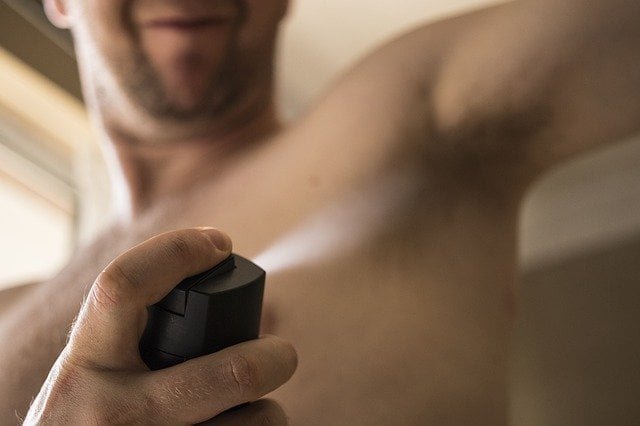Pure sweat is actually odorless.

Pure sweat is actually odorless.
But bacteria on the skin, hormones, compounds in certain foods, and other factors.
It can cause sweat smell like vinegar or something else.
In some cases, the pungent vinegar smell in sweat may be the result of an underlying health condition, such as diabetes or kidney disease. Below we review the ways to remove bad body odor.
What should I know about race?
Sweating is one of the body’s cooling mechanisms. Sweat exits through the skin from the sweat glands. You have two types of sweat glands:
Septal : This type is found in areas of hair, such as the armpits and thighs, and it releases a type of sweat that contains milk when we drink milk.
Ecrin : These are found all over the body and are called a clear duct.
Sweat is made almost entirely of water, but it also contains:
°salts
°sugars
°urea
°ammonia
Changes in the contents of the sweat can change the smell of sweat. Eat some foods like:
Spices and condiments:
لا يقتصر الامر على انفاسك فقط التي يمكن ان تتخلص مما اكلته مؤخرا. الطريقة التي يكسر بها الجسم الخل، والبصل ،والثوم، والكاري، والكمون والتوابل، والتوابل الاخرى يمكن ان تترك المركبات التي تأتي من خلال العرق ،مما يعطيها رائحه مميزه.
Meat and dairy:
Other foods, such as red meat, may also alter the smell of sweat. Dairy products, including milk and cheese, may do the same thing. In general, foods that contain many types of volatile compounds can alter the smell of sweat.
Stress :
When you’re stressed, your apocrine glands are activated, and your vinegar-scented stress sweat can let others know you’re feeling stressed.
hormonal changes:
Fluctuations in your hormone levels due to puberty and older age, menstruation, pregnancy, and menopause, can cause odor changes that came through sweat.
Cortices:
The bacteria caused by Corynebacterium can cause a skin infection that smells like vinegar or other strong odors.
These infections generally affect: •
Feet •
thigh
• armpits
Trichomoniasis:
A bacterial infection that affects the hair follicles under the armpit. Trichomoniasis is not contagious or life-threatening,
but trichomoniasis can be unpleasant and affect the smell of sweat. It is one of the many types of skin infections that can affect the smell of sweat.
Excessive sweating
If your body and especially your feet are sweating excessively, especially in circumstances that shouldn’t cause a lot of sweating like relaxing in the calm of cold weather, you may have a chance of sweating. It’s a treatable disorder that sometimes accompanies menopause and thyroid disease but may be present on its own. An abnormal amount of sweat can lead to a strong vinegar smell.
diabetic :
When diabetics are not managed properly, more glucose stays in the bloodstream rather than the cells where it can be used for energy. Instead of glucose, the body burns fat for energy, releasing metabolites, such as acetone, in sweat and breathing. Acetone may smell sweet or fruity, but it may also smell like vinegar.
Kidney disease:
Changes in the smell of sweat and urine can indicate the presence of vital signs of kidney disease in addition to other conditions, such as cystic fibrosis and some forms of cancer.
What are some home remedies for vinegar that smells like sweat:
Bathe regularly :
This may sound obvious, but the easiest way to deal with smelly sweat is to wash it off. Bathing daily (or as often as necessary) with an antibacterial soap may help reduce the levels of bacteria on your skin that react with sweat.
Use deodorant antiperspirant:
Deodorant and antiperspirant are often discussed interchangeably. But they are two completely different products
• Deodorants work to mask body odor with a different and hopefully stronger scent
• Antiperspirants actually prevent your sweat pores from releasing sweat
You may need to try different products to find the ones that work best with your body chemistry.
change your clothes :
Sweat and the associated odor can remain on clothes long after you stop sweating. If possible, you can change your clothes, especially shirts and blouses, to change as needed.
When should he see a doctor:
A strong body odor related to sweat, known as sweating, can affect your self-esteem and social life.
While a noticeable sweat smell can sometimes be treated with some simple home remedies, there are cases where medical intervention is necessary.
If changes in your personal hygiene routine do not reduce the odor and remain as strong and consistent as ever (and become more noticeable), speak with your doctor.
It is especially important if you notice these other symptoms, which may indicate a serious medical condition:
• Changes in the smell of urine. It may be a sign of diabetes or kidney problems.
• Pus, blisters, or other changes on the skin, which may indicate a skin infection.
Sudden weight loss or weight gain, which may indicate conditions ranging from diabetes to cancer.
What are the medical treatments for sweat that smells like vinegar:
Antibiotics :
When a bacterial infection causes a change in the smell of sweat, antibiotics may be enough to fight the infection and restore normal body chemistry.
Prescription antiperspirants and creams:
If you’ve been diagnosed with hyperhidrosis, strong, prescription-strength topical treatments may help.
Botox:
Botulinum toxin A (Botox) injections into the armpit can block nerve signals to the sweat glands, limiting their production of sweat.
For microwave pyrolysis:
For excessive armpit sweating, a relatively new treatment called microwave thermolysis is available to destroy the sweat glands on the lower arms using directed beams of energy.
There is only a small part of your body’s sweat glands in the armpit, so destroying them will not affect your body’s natural cooling system.
كيف امنع رائحه العرق القوية :
Sometimes, changes in your diet or lifestyle can prevent or at least reduce cases where sweat smells like vinegar. Here are some recommendations:
• Change your diet: If you notice that some foods stimulate the smell of vinegar in the sweat, consider avoiding them or eating them in smaller quantities.
• Drink more water: The more water you drink, the more dilute your sweat becomes. This helps reduce the intensity of anything that might smell like vinegar, such as vinegar or ammonia.
• Choose the right clothes: Natural fabrics, such as cotton, allow your skin to breathe and can help keep you cool.
b For workout clothes , fabrics that absorb moisture from the skin may also help.
• relax: Because stress is a common trigger for sweat, learn practices like meditation, yoga, and deep breathing to help you.



